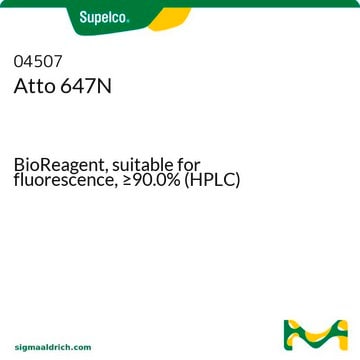68499
Atto 532 maleimide
BioReagent, suitable for fluorescence, ≥90% (coupling to thiols)
Sign Into View Organizational & Contract Pricing
All Photos(1)
About This Item
Recommended Products
product line
BioReagent
assay
≥90% (coupling to thiols)
form
powder
manufacturer/tradename
ATTO-TEC GmbH
fluorescence
λex 532 nm; λem 553 nm in 0.1 M phosphate pH 7.0
suitability
suitable for fluorescence
storage temp.
−20°C
Application
Atto fluorescent labels are designed for high sensitivity applications, including single molecule detection. Atto labels have rigid structures that do not show any cis-trans-isomerization. Thus these labels display exceptional intensity with minimal spectral shift on conjugation.
Legal Information
This product is for Research use only. In case of intended commercialization, please contact the IP-holder (ATTO-TEC GmbH, Germany) for licensing.
Storage Class
11 - Combustible Solids
wgk_germany
WGK 3
flash_point_f
Not applicable
flash_point_c
Not applicable
Certificates of Analysis (COA)
Search for Certificates of Analysis (COA) by entering the products Lot/Batch Number. Lot and Batch Numbers can be found on a product’s label following the words ‘Lot’ or ‘Batch’.
Already Own This Product?
Find documentation for the products that you have recently purchased in the Document Library.
Moritz Marcinowski et al.
Nature structural & molecular biology, 18(2), 150-158 (2011-01-11)
The endoplasmic reticulum is the site of folding, assembly and quality control for proteins of the secretory pathway. The ATP-regulated Hsp70 chaperone BiP (heavy chain-binding protein), together with cochaperones, has important roles in all of these processes. The functional cycle
Kiyoto Kamagata et al.
Journal of the American Chemical Society, 134(28), 11525-11532 (2012-06-14)
A method was developed to detect fluorescence intensity signals from single molecules diffusing freely in a capillary cell. A unique optical system based on a spherical mirror was designed to enable quantitative detection of the fluorescence intensity. Furthermore, "flow-and-stop" control
STED microscopy reveals nanoparticle assemblies
Willig, K.I., et al.
New Journal of Physics, 8, 1-1 (2006)
Chunlai Chen et al.
Nucleic acids research, 35(9), 2875-2884 (2007-04-14)
Hybridization of nucleic acids with secondary structure is involved in many biological processes and technological applications. To gain more insight into its mechanism, we have investigated the kinetics of DNA hybridization/denaturation via fluorescence resonance energy transfer (FRET) on perfectly matched
Toshiro Saito et al.
Nanotechnology, 22(44), 445708-445708 (2011-10-13)
We fabricated platinum bowtie nanostructure arrays producing fluorescence enhancement and evaluated their performance using two-photon photoluminescence and single-molecule fluorescence measurements. A comprehensive selection of suitable materials was explored by electromagnetic simulation and Pt was chosen as the plasmonic material for
Our team of scientists has experience in all areas of research including Life Science, Material Science, Chemical Synthesis, Chromatography, Analytical and many others.
Contact Technical Service




